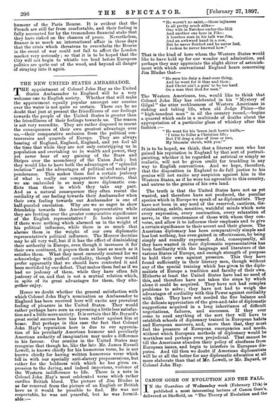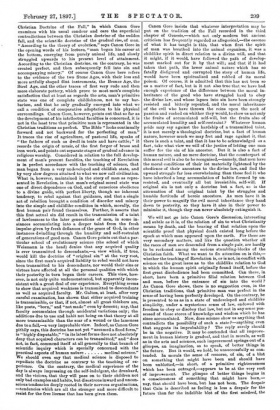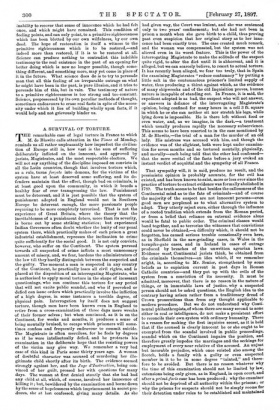CANON GORE ON EVOLUTION AND THE FALL.
IN the Guardian of Wednesday week (February 17th) is published a most interesting lecture of Canon Gore's, delivered at Sheffield, on "The Theory of Evolution and the
created perfect, and then subsequently fell into sin and accompanying misery." Of course Canon Gore here refers to the evidence of the two Stone Ages, with their less and more artfully shaped flint instruments, the Bronze Age, the Steel Age, and the other traces of first very rude and then more elaborate pottery, which prove to most men's complete satisfaction that at least as regards the arts, man's primitive state was one of complete childishness, not to say bar- barism, and that he only gradually emerged into what we call a condition of comparative adaptation to his physical the development of his intellectual faculties is concerned, it is not in the least true that primitive man is represented in the Christian traditions as perfect. The Bible " looks continually forward and not backward for the perfecting of man."
It traces the rise of agriculture, of pastoral life, speaks of records the origin of music, of the first forger of brass and iron work, and points out separate stages of gradual advance in religious worship. Considered in relation to the full develop- ment of man's present faculties, the teaching of Revelation man began from a very undeveloped and childish state, and by very slow degrees attained to what we now call civilisation.
What is, however, maintained in the story of man as repre- minimise it, though they can never absolutely extinguish it. first human pair found themselves. Further, it asserts that this first actual sin did result in the transmission of a taint of lawlessness to the later generations of men, in some in.
would kill the doctrine of "original sin" at the very root, since the first man's acquired liability to rebel would not have whether the teaching of Revelation is, or is not, in conflict with been transmitted to his descendants, nor would their sins or science on the great issue as to the childlike relation to God virtues have affected at all the personal qualities with which their posterity in turn began their careers. This view, how- ever, is not only quite undemonstrated, but apparently incon- sistent with a great deal of our experience. Everything seems to show that acquired weakness is transmitted to descendants as well as acquired faculty. Mr. Galton, at least, after very careful examination, has shown that either acquired training is transmissible, or that, if not, almost all great thinkers are, like poets, "born," and "not made" even by descent; nay, that faculty accumulates through accidental variations only ; the additions due to use and habit not being on that theory at all more transmissible than the scar of a wound or the lameness due to a fall,—a very improbable view. Indeed, as Canon Gore pithily says, this doctrine has not yet "assumed a fixed form," is "highly disputable," "in its latest forms does not absolutely deny that acquired characters can be transmitted," and " does not, in fact, commend itself at all generally to that branch of scientific inquiry which is specially concerned with the practical aspects of human nature medical science." We should even say that medical science is disposed to repudiate the doctrine as contrary to the teaching of ex- perience. On the contrary, the medical experience of the day is always impressing on the self-indulgent, the drunkard, and the vicious, that they will pass on to their children not only bad examples and habits, but disastrous inward and uncon- scious tendencies deeply rooted in their nervous organisations, —tendencies which are all the stronger and more difficult to resist for the free license that has been given them. epoch at which man appeared upon the earth. For these are ticular school of evolutionary science (the school of which very secondary matters, and like the question whether all Weismann is the head) denies that any acqnired quality is ever transmitted to descendants,—a view which, if true, Christian Doctrine of the Fall," in which Canon Gore Canon Gore insists that whatever interpretation may be examines with his usual candour and care the superficial put on the tradition of the Fall recorded in the third contradictions between the Christian doctrine of the sudden chapter of Genesis,—which not only modern but ancient fall, and the scientific doctrine of the gradual rise, of man. criticism has frequently regarded as allegorical,—the essence "According to the theory of evolution," says Canon Gore in of what it has taught is this, that when first the spirit the opening words of his lecture, "man began his career at the bottom, emerging from purely animal life, and slowly of man was breathed into the animal organism, it was a childlike spirit in direct relation to a divine will, and that it might, if it would, have followed the path of develop- struggled upwards to his present level of attainment. ment marked out for it by that will ; and that if it had According to the Christian doctrine, on the contrary, he was taken that path, the lower animal nature which has so fatally disfigured and corrupted the story of human life, would have been spiritualised and robbed of its moral poison. Of course, it is admitted that this has not been so as a matter of fact, but is it not also true that we have had enough experience of the difference between the moral in- heritance of the good who have struggled hard to obey the divine law, and whose lapses into sin have been strongly resisted and bitterly repented, and the moral inheritance of the evil who have thrown the reins upon the neck of surroundings. Canon Gore, however, points out that so far as passion and rushed on whither they would, to show us not only the fruits of accumulated self-will, but the fruits also of accumulated humility and self-restraint ? Whatever human pride may say against the hardship of a transmitted taint, it is not merely a theological doctrine, but a fact of human nature, however much we may fret and rage against it, that " the fathers of such as dwell in tents and have cattle; " it there is such a taint, and that it has to be acknowledged as a fact, take what view we will of the justice of letting one man suffer for the sin of his ancestor. But it is also a fact of human nature, and no mere doctrine, that the counterpart of this moral evil is also to be recognised,—namely, that men have is in perfect accordance with the teaching of science, that the moral conditions of their lot materially lightened by the obedience of their ancestors to the divine law, and find the upward struggle far less overwhelming than those feel it who have inherited a long accumulation of habits formed by un- sented in Revelation, is that man's original moral state was resisted, and eventually all but irresistible, self-will. If one of direct dependence on God, and of conscious obedience original sin is not only a doctrine but a fact, so is the to a divine guide, with perfect liberty, though no inherent attenuation of that original taint by the struggles and tendency, to rebel against that guidance, and that a single humble fortitude of heroic ancestors. As men have it in act of rebellion brought a condition of disorder and misery their power to magnify the evil moral inheritance they hand into the simple and childlike condition in which, morally, the down to posterity, so they have it also in their power to the races of men are descended from a single pair, are hardly to be reckoned among the serious stumbling-blocks of the Christian faith. What we want to fix attention on is this,— in which the human spirit originally found itself, before the We will not go into Canon Gore's discussion, interesting stances accumulating into a deeper taint from the fresh and subtle as it is, of the relation of sin to what Christianity impulse given by fresh defiances of the grace of God, in other means by death, and the bearing of that relation upon the s instances dwindling through the humility and self-restraint scientific proof that physical death existed long before the of generations of good men. Canon Gore points out that a par- first great disobedience had been committed. Can there, in short, have been a primitive filial relation between God and man, before the entrance of sin into the world ? As Canon Gore shows, there is no suggestion even, in the Christian traditions, that primitive man was perfect in the sense of having been perfectly developed. On the contrary, he is presented to us as in a state of undeveloped and childlike simplicity, under a mysterious sense of law, endowed with freedom to obey or disobey that law, but not in any sense pos- sessed of those stores of knowledge and wisdom which he has since accumulated. Now, does science show us anything that contradicts the possibility of such a state ?—anything even that suggests its improbability ? The reply surely should be in the negative. It may be contended that all improve- ment in human history is gradual, and that in morals, as well as in the arts and sciences, such improvement springs out of a glimpse, an imagination, so to speak, of better things in the future. But it would, we hold, be unsuccessfully so con- tended. In morals the sense of remorse, of sin, of a blot on something that might have been and should have been unblotted,—in short, of a primitive righteousness which has been outraged,—appears to be at the very root of improvement. The glimpse of better things begins in a consciousness of something that might have been,— nay, that should have been, but has not been. The despair that Cain is described as feeling is less a despair for the future than for the indelible blot of the first misdeed, the inability to recover that sense of innocence which he had felt once, and which might have remained. This condition of feeling points, and can only point, to a primitive righteousness which has been blotted by our own wilfulness, by our own deed. The hope of restoration is itself a witness to the primitive righteousness which is to be restored,—and indeed more than restored, if it is to be restored at all. Science can produce nothing to contradict this indelible testimony to the real existence in the past of an opening for better doing which is now no longer possible, though some- thing different, and something more, may yet come in place of it in the future. What science does do is to try to persuade man that all this feeling of an irreparable outrage on what he might have been in the past, is pure illusion, and it tries to persuade him of this, but in vain. The testimony of nature to a primitive righteousness is too strong and too constant. Science, prepossessed by its own peculiar methods of thought, sometimes endeavours to erase real facts in spite of the neces- sity under which it lies of building wholly upon facts, if it would help and not grievously hinder us.




































 Previous page
Previous page